Oil for the Lamps of China

Brief Synopsis
Cast & Crew
Mervyn Leroy
Pat O'brien
Josephine Hutchinson
Jean Muir
Lyle Talbot
Arthur Byron
Film Details
Technical Specs

Synopsis
Stephen Chase is employed by a large oil company that preaches that it always takes care of its own. The company sends Stephen to Manchuria, where he ends his three-year apprenticeship by inventing a lamp that burns kerosene cheaply. After he suggests to the company that they give his lamps free to the Chinese to encourage them to buy oil, he receives permission to marry from his boss and leaves for Yokohama where he is to meet his fiancée. Just before her boat is scheduled to land, however, Stephen receives a telegram from his intended, calling off the wedding. Distraught, he has a drink in the hotel bar, where he strikes up a conversation with a woman on her own. Learning that the woman, Hester Adams, had been traveling through the Orient with her father until he died on board ship, Stephen asks her to have dinner with him. After explaining that it is important to maintain face in China, he tells Hester that everyone expects him to return with a wife and proposes that they form a partnership in which she will marry him and he will take care of her. After some thought, she agrees. Upon their arrival in China, Hester is determined to meet her wifely obligations, although both she and Stephen are unsure about their feelings toward each other. The boss, meanwhile, tells Stephen that the company is shipping the lamp that he invented, but that another employee will receive credit for the invention. More bad news is forthcoming when the boss commits suicide after being replaced by a younger man. For the first time, Stephen feels that the company is unjust and unfair. As Hester comforts him, she and Stephen realize that they have fallen in love. The new boss, McCargar, orders Stephen to a post near the Siberian border. He tries to refuse the transfer because Hester is expecting a baby, but McCargar is firm. Feeling that her place is with Stephen, Hester insists on accompanying him. While she is in labor, one of the oil wells catches fire, and Stephen leaves her alone with the doctor. When he returns, he finds the baby dead. Hester blames him for the child's death and falls into a deep depression. Stephen is ordered to report to Shanghai to explain why he took certain actions during the fire without clearing them first with the company. He is released after a scolding and returns to find Hester reconciled to her life. They are transferred again to Southern China, where they become friendly with Don and Alice, the other couple assigned to the city. Don and Alice's small son Bunsy soon takes the place of her own child in Hester's heart. Facing slow sales because of drought and cholera, Stephen and Don go into the field to make the sales themselves. While they are gone, Bunsy develops cholera and Hester nurses him back to health. The leader of the Chinese community does not like Don and tells Stephen that they will renew their contract only if Don is fired. Hester begs him not to fire his best friend, but Stephen protests that his work is his identity and he cannot throw it away. The company sends McCargar to join Stephen, and together they face a new threat from the Communist rebels. The rebels demand all the money in the company safe, and Stephen agrees to give them the cash if they will allow Hester to board the ship first. As soon as Hester is on board, Stephen and McCargar try to escape through a swamp with the money. McCargar is killed, and Stephen is injured but saves the money for the company. While he is recuperating in the hospital, Stephen is asked to be second-in-command in charge of the Orient, but when he recovers, he finds that Bill Kendall has been appointed in his place because the company felt that Stephen was not progressive enough. Determined to hang on to the company until he can receive his pension, Stephen continues to work at a clerk's job. Furious, Hester informs the company that Stephen holds the patent on the lamp he invented and that she will sue for royalities unless they restore him to a good position. Finally, the company responds, leaving Stephen with the belief that the company does in fact take care of its own.

Director

Mervyn Leroy
Cast
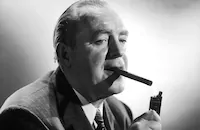
Pat O'brien

Josephine Hutchinson

Jean Muir
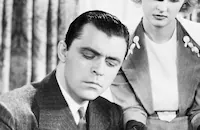
Lyle Talbot

Arthur Byron
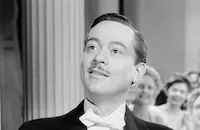
John Eldredge
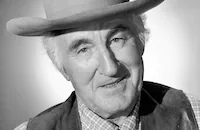
Donald Crisp
Willie Fung
Tetsu Komai
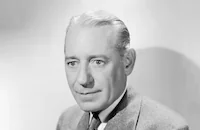
Henry O'neill
Ronnie Cosby

William Davidson

George Meeker

Joseph Crehan
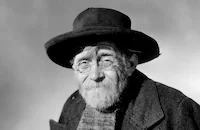
Christian Rub
Willard Robertson

Edward Mcwade
Florence Fair

Keye Luke
Crew

Film Details
Technical Specs

Articles
Oil for the Lamps of China - Oil For the Lamps of China
The project originally was earmarked for dramatic actor Franchot Tone, but Warner's couldn't arrange a loan from his home studio, MGM. In a surprise move, they gave the role to Pat O'Brien, best known at the time for a series of buddy films with James Cagney. O'Brien was glad for a break from the formulaic films he'd made with his pal. Though he loved working with Cagney, he was happy to sink his teeth into a real dramatic role for a change. And there was still enough action to draw on his popularity from the Cagney films.
To guarantee the authenticity of this and several other China-set properties they had in the works, Warners sent director Robert Florey to China for background footage. To avoid paying high export fees, he had to work in secret, but he still managed to smuggle 20,000 feet of film out of the country. Then Warners canceled the other pictures and decided his background footage was too realistic. Not only didn't they use it, they never even paid him for his work. Instead, they sent the production crew to the Mojave Desert for location work.
For director Mervyn LeRoy, the most memorable thing about Oil for the Lamps of China was the fact that his first child was born during production. In fact, when word reached him that his wife had gone into labor, he dropped everything and left the set - and 300 Chinese extras - without telling anybody where he had gone. Studio head Jack Warner was frantic, convinced LeRoy had been kidnapped, until LeRoy came back from the hospital to finish the day's shooting.
Oil for the Lamps of China got respectable reviews and did good business, but LeRoy was hurt by a vicious pan in the San Francisco Examiner, one of the newspapers owned by William Randolph Hearst. The director was weekending at San Simeon when he mentioned his disappointment to Hearst's mistress, film star Marion Davies. She immediately took the matter to "Poppy," as she called Hearst in kinder moments (when she wasn't calling him "Old Droopy Drawers"). Hearst summoned LeRoy to his room and advised him, "Just remember this - the newspaper of today is the toilet paper of tomorrow." LeRoy always called that some of the best advice he'd ever been given.
Director: Mervyn LeRoy
Producer: Robert Lord
Screenplay: Laird Doyle
Based on the novel by Alice Tisdale Hobart
Cinematography: Tony Gaudio
Art Direction: Robert Haas
Score: Leo F. Forbstein
Cast: Pat O'Brien (Stephen Chase), Josephine Hutchinson (Hester Chase), Jean Muir (Alice Wellman), Lyle Talbot (Jim), Henry OÕNeill (Hartford), Donald Crisp (MacCargar), Keye Luke (Young Chinese)
BW-98m.
by Frank Miller

Oil for the Lamps of China - Oil For the Lamps of China
Quotes
Two things matter to a man, the woman he loves and the work he does.- Hester Adams Chase
We're in a time of social changes, and social changes cost money.- Young Chinese Soldier
Trivia
Notes
Film Daily lists a preview running time of 110 minutes and Daily Variety notes a preview running time of 120 minutes. Shorter release times listed by other sources indicate that some cuts were made before the film's general release. Contemporary sources note that in contrast to the best-selling novel on which it was based, the film does not indict the oil business for the impersonal tyranny with which it treats its employees. An early Motion Picture Herald article includes Olive Jones in the cast, but her participation in the final film has not been confirmed. According to a news item in Hollywood Reporter, Franchot Tone was originally assigned the Pat O'Brien role. A news item in Daily Variety notes that Henry O'Neill replaced Robert Barrat when he was assigned to The Farrell Case which was later entitled G-Men. A news item in Film Daily states that scenes for the film were shot in the Mojave Desert. A news item indicates that Robert Florey was sent to China to obtain background shots for this film and others with a Chinese setting which the studio planned to produce. According to modern sources, Florey spent three weeks in China shooting backgrounds for a number of projects of which only Oil for the Lamps of China was actually produced. The production chief advised Florey and his cameramen, Fred Jackman and George Krainukov, to work secretly. In this way, they were able to smuggle 20,000 ft. of film out of China without submitting it for censorship or paying official fees. Modern sources note that Florey was paid nothing for his work, which was judged too realistic to be used. According to Hollywood Reporter, Warner Bros. was looking for a script writer with a Chinese background. According to Daily Variety, the treatment was looked over by Yi-seng S. Kiang, the motion picture representative of the Chinese government in Los Angeles. The main objections of the Chinese government were said to be "civil war sequences, the bound feet of women, the wearing of queues, concubinage, opium smoking, superstitious beliefs and the use of the words 'Chinaman' and 'Chink'." Background shots were also carefully scrutinized. Hobart's novel was the basis of the 1941 Warner Bros. film Law of the Tropics directed by Ray Enright and starring Jeffrey Lynn and Constance Bennett.















